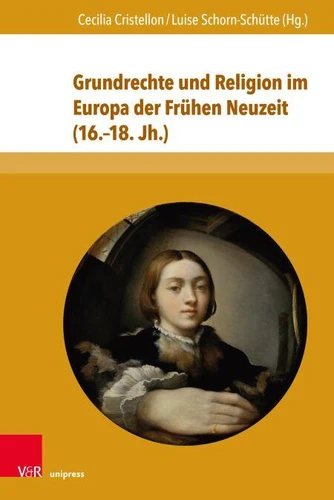Grundrechte und Religion im Europa der Frühen Neuzeit (16.–18. Jh.)
Par : , ,Formats :
Disponible dans votre compte client Decitre ou Furet du Nord dès validation de votre commande. Le format PDF est :
- Compatible avec une lecture sur My Vivlio (smartphone, tablette, ordinateur)
- Compatible avec une lecture sur liseuses Vivlio
- Pour les liseuses autres que Vivlio, vous devez utiliser le logiciel Adobe Digital Edition. Non compatible avec la lecture sur les liseuses Kindle, Remarkable et Sony
 , qui est-ce ?
, qui est-ce ?Notre partenaire de plateforme de lecture numérique où vous retrouverez l'ensemble de vos ebooks gratuitement
Pour en savoir plus sur nos ebooks, consultez notre aide en ligne ici
- Nombre de pages178
- FormatPDF
- ISBN978-3-8470-0725-8
- EAN9783847007258
- Date de parution17/06/2019
- Protection num.pas de protection
- Taille3 Mo
- Infos supplémentairespdf
- ÉditeurV&R Unipress
Résumé
Menschenwürde und Grundrechte werden häufig als Phänomen des 20. Jahrhunderts charakterisiert. Doch erstmals wurden diese Normen in Antike und frühem Christentum benannt und charakterisiert, wie dieser Band zeigt. Die Beiträge beschäftigen sich mit der Entwicklung der Grundrechte im Europa der Frühen Neuzeit und erörtern die Frage nach deren Bedeutung und Dimension aus theologischer, historischer und rechtshistorischer Perspektive.
Ausgehend von Untersuchungen der juristischen und theologischen Dimension von Begriffen wie »Gewissen« oder »Gerechtigkeit« bietet der Band einen Einblick in die frühneuzeitliche Erfahrung von Grundrechten und in die auf Normenvielfalt innerhalb der christlichen Konfessionen und des Judentums beruhenden Praktiken, die bisweilen damit verbunden wurden. Human dignity and basic rights have often been characterised as phenomena of the 20th century.
However, as this volume will show, these norms were firstly described and characterised in the ancient era and early Christianity. The contributions focus on the development of the basic rights in Europe in the early modern ages and discuss their meaning and dimension from a theological, historical and legal-historical perspective. Based on legal and theological analyses of terms such as "consciousness" or "justice" this volume offers an insight in early modern experiences of basic rights in various norms within the Christian confessions and Judaism and its related methods.
Ausgehend von Untersuchungen der juristischen und theologischen Dimension von Begriffen wie »Gewissen« oder »Gerechtigkeit« bietet der Band einen Einblick in die frühneuzeitliche Erfahrung von Grundrechten und in die auf Normenvielfalt innerhalb der christlichen Konfessionen und des Judentums beruhenden Praktiken, die bisweilen damit verbunden wurden. Human dignity and basic rights have often been characterised as phenomena of the 20th century.
However, as this volume will show, these norms were firstly described and characterised in the ancient era and early Christianity. The contributions focus on the development of the basic rights in Europe in the early modern ages and discuss their meaning and dimension from a theological, historical and legal-historical perspective. Based on legal and theological analyses of terms such as "consciousness" or "justice" this volume offers an insight in early modern experiences of basic rights in various norms within the Christian confessions and Judaism and its related methods.
Menschenwürde und Grundrechte werden häufig als Phänomen des 20. Jahrhunderts charakterisiert. Doch erstmals wurden diese Normen in Antike und frühem Christentum benannt und charakterisiert, wie dieser Band zeigt. Die Beiträge beschäftigen sich mit der Entwicklung der Grundrechte im Europa der Frühen Neuzeit und erörtern die Frage nach deren Bedeutung und Dimension aus theologischer, historischer und rechtshistorischer Perspektive.
Ausgehend von Untersuchungen der juristischen und theologischen Dimension von Begriffen wie »Gewissen« oder »Gerechtigkeit« bietet der Band einen Einblick in die frühneuzeitliche Erfahrung von Grundrechten und in die auf Normenvielfalt innerhalb der christlichen Konfessionen und des Judentums beruhenden Praktiken, die bisweilen damit verbunden wurden. Human dignity and basic rights have often been characterised as phenomena of the 20th century.
However, as this volume will show, these norms were firstly described and characterised in the ancient era and early Christianity. The contributions focus on the development of the basic rights in Europe in the early modern ages and discuss their meaning and dimension from a theological, historical and legal-historical perspective. Based on legal and theological analyses of terms such as "consciousness" or "justice" this volume offers an insight in early modern experiences of basic rights in various norms within the Christian confessions and Judaism and its related methods.
Ausgehend von Untersuchungen der juristischen und theologischen Dimension von Begriffen wie »Gewissen« oder »Gerechtigkeit« bietet der Band einen Einblick in die frühneuzeitliche Erfahrung von Grundrechten und in die auf Normenvielfalt innerhalb der christlichen Konfessionen und des Judentums beruhenden Praktiken, die bisweilen damit verbunden wurden. Human dignity and basic rights have often been characterised as phenomena of the 20th century.
However, as this volume will show, these norms were firstly described and characterised in the ancient era and early Christianity. The contributions focus on the development of the basic rights in Europe in the early modern ages and discuss their meaning and dimension from a theological, historical and legal-historical perspective. Based on legal and theological analyses of terms such as "consciousness" or "justice" this volume offers an insight in early modern experiences of basic rights in various norms within the Christian confessions and Judaism and its related methods.



